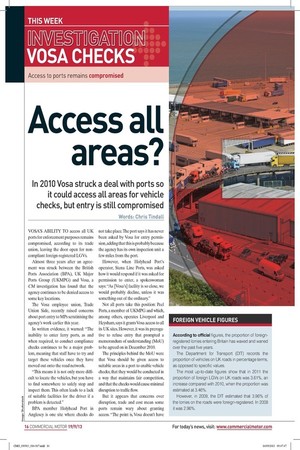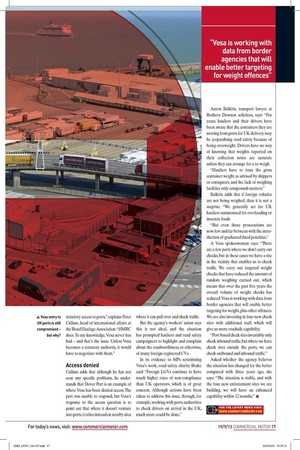Access all areas?
Page 11

Page 12

If you've noticed an error in this article please click here to report it so we can fix it.
In 2010 Vosa struck a deal with ports so it could access all areas for vehicle checks, but entry is still compromised
VOSA'S ABILITY TO access all UK ports for enforcement purposes remains compromised, according to its trade union, leaving the door open for noncompliant foreign-registered LGVs.
Almost three years after an agreement was struck between the British Ports Association (BPA), UK Major Ports Group (UKMPG) and Vosa, a CM investigation has found that the agency continues to be denied access to some key locations.
The Vosa employee union, Trade Union Side, recently raised concerns about port entry to MPs scrutinising the agency's work earlier this year.
In written evidence, it warned: "The inability to enter ferry ports, as and when required, to conduct compliance checks continues to be a major problem, meaning that staff have to try and target these vehicles once they have moved out onto the road network.
"This means it is not only more difficult to locate the vehicles, but you have to find somewhere to safely stop and inspect them. This often leads to a lack of suitable facilities for the driver if a problem is detected." BPA member Holyhead Port in Anglesey is one site where checks do
not take place. The port says it has never been asked by Vosa for entry permission, adding that this is probably because the agency has its own inspection unit a few miles from the port.
However, when Holyhead Port's operator, Stena Line Ports, was asked how it would respond if it was asked for permission to enter, a spokeswoman says: "As [Vosa's] facility is so close, we would probably decline, unless it was something out of the ordinary."
Not all ports take this position: Peel Ports, a member of UKMPG and which, among others, operates Liverpool and Heysham, says it grants Vosa access to all its UK sites. However, it was its prerogative to refuse entry that prompted a memorandum of understanding (MoU) to be agreed on in December 2010.
The principles behind the MoU were that Vosa should be given access to suitable areas in a port to enable vehicle checks; that they would be conducted in a way that maintains fair competition, and that the checks would cause minimal disruption to traffic flow. But it appears that concerns over disruption, trade and cost mean some ports remain wary about granting access. "The point is, Vosa doesn't have
statutory access to ports," explains Peter Cullum, head of international affairs at the Road Haulage Association."HMRC does. To my knowledge, Vosa never has had and that's the issue. Unless Vosa becomes a statutory authority, it would have to negotiate with them."
Access denied
Cullum adds that although he has not seen any specific problems, he understands that Dover Port is an example of where Vosa has been denied access. The port was unable to respond, but Vosa's response to the access question is to point out that where it doesn't venture into ports, it relies instead on nearby sites
where it can pull over and check traffic.
But the agency's workers' union says this is not ideal, and the situation has prompted hauliers and road safety campaigners to highlight and complain about the roadworthiness, or otherwise, of many foreign-registered CVs.
In its evidence to MPs scrutinising Vosa's work, road safety charity Brake said: "Foreign LGVs continue to have much higher rates of non-compliance than UK operators, which is of great concern. Although actions have been taken to address this issue, through, for example, working with ports authorities to check drivers on arrival in the UK, much more could be done."
Anton Balkitis, transport lawyer at Rothera Dowson solicitors, says: "For years, hauliers and their drivers have been aware that the containers they are moving from ports for UK delivery may be jeopardising road safety because of being overweight. Drivers have no way of knowing that weights reported on their collection notes are accurate unless they can arrange for a re-weigh.
"Hauliers have to trust the gross container weight as advised by shippers or consignors, and the lack of weighing facilities only compounds matters."
Balkitis adds that if foreign vehicles are not being weighed, then it is not a surprise. "We generally act for UK hauliers summonsed for overloading or insecure loads.
"But even those prosecutions are now few and far between with the introduction of graduated fixed penalties."
A Vosa spokeswoman says: "There are a few ports where we don't carry out checks, but in these cases we have a site in the vicinity that enables us to check traffic. We carry out targeted weight checks that have reduced the amount of random weighing carried out, which means that over the past five years the overall volume of weight checks has reduced. Vosa is working with data from border agencies that will enable better targeting for weight, plus other offences. We are also investing in four new check sites with additional staff which will give us more roadside capability.
"Port-based check sites invariably only check inbound traffic, but where we have check sites outside the ports, we can check outbound and inbound traffic." Asked whether the agency believes the situation has changed for the better compared with three years ago, she says: "The situation is stable, and with the four new enforcement sites we are building, we will have an enhanced capability within 12 months." •







































